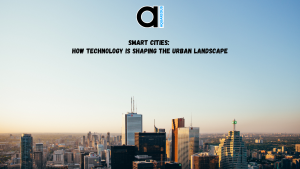Smart Cities: How Technology is Shaping the Urban Landscape

In recent years, urban areas have witnessed a transformative shift towards becoming smarter and more technologically advanced. This paradigm shift or Sustainable Urban Development is the result of innovative technologies reshaping the urban landscape, giving rise to what we now call “Smart Cities.” This article delves into the various facets of Sustainable Urban Development or how technology is shaping the urban landscape and the numerous benefits and challenges that come with it.
The Concept of Smart Cities and Sustainable Urban Development
Smart Cities represent a revolutionary approach to urban living, where cutting-edge technology is seamlessly integrated into various aspects of city planning and management. The primary goal of Sustainable Urban Development is to enhance the quality of life for residents by optimizing resources and services through data-driven solutions.
Technology Integration in Sustainable Urban Development Planning
In Smart Cities, technology seamlessly weaves into urban planning. IoT devices and sensors gather real-time data on traffic flow, energy consumption, and public services. This data empowers city planners to make informed decisions, ensuring resources are allocated efficiently. For example, smart traffic lights adjust timings based on traffic patterns, reducing congestion and emissions. Additionally, augmented reality and simulation tools aid in visualising future urban developments, enhancing the accuracy and effectiveness of planning decisions.
Enhanced Connectivity and Communication in Sustainable Urban Development
Smart Cities thrive on robust connectivity. High-speed internet and 5G networks enable seamless communication between citizens, public services, and city authorities. This interconnectedness forms the backbone of various smart solutions. For instance, citizens can access real-time information on public transport schedules, reducing wait times and increasing overall efficiency. Moreover, smart grids and IoT sensors allow for instant monitoring and management of energy consumption, leading to more sustainable practices.
Sustainable Energy Solutions
Smart Cities champion sustainable energy sources, revolutionising the way cities consume and generate power. Integration of solar panels, wind turbines, and advanced grid systems reduces reliance on traditional, fossil-fuel-based energy. Additionally, energy-efficient technologies are implemented across public spaces and buildings, further diminishing the environmental footprint. Smart grids intelligently manage energy distribution, balancing supply and demand while minimising waste. These initiatives not only reduce emissions but also pave the way for greener, more eco-conscious urban environments.
Intelligent Transportation Systems
Efficient mobility is at the heart of Smart Cities. Intelligent transportation systems leverage technology to optimise traffic flow and public transit. Real-time data informs commuters of the fastest and most eco-friendly routes, reducing travel times and congestion. Moreover, smart traffic management systems adapt to changing conditions, further improving overall efficiency. Electric and autonomous vehicles are integrated into the transportation network, reducing emissions and enhancing urban air quality. These advancements herald a new era of sustainable, convenient transportation in urban areas.
Efficient Waste Management
Smart Cities revolutionise waste management through the integration of sensors and data analytics. Waste collection schedules are optimised based on fill levels, reducing unnecessary trips and associated emissions. Recycling rates are increased through targeted campaigns and incentivised programmes. Additionally, IoT-enabled bins provide real-time feedback to waste management teams, allowing for swift response to any issues. Smart technologies also facilitate the sorting and processing of waste, further streamlining the recycling process. These innovations not only reduce landfill waste but also contribute to a more sustainable, eco-conscious urban ecosystem.
Improved Healthcare Services
Technology-driven healthcare solutions are paramount in Smart Cities. Telemedicine and wearable health monitors provide residents with convenient, accessible healthcare options. Remote monitoring of vital signs allows for early intervention and proactive healthcare management. Additionally, AI-driven diagnostics enhance the accuracy and efficiency of medical assessments. Smart health records ensure seamless information sharing between healthcare providers, leading to more coordinated and effective care. These innovations not only improve healthcare accessibility but also empower residents to take charge of their own well-being.
Enhanced Safety and Security Measures
Smart Cities implement cutting-edge security solutions to ensure the safety of their inhabitants. AI-powered facial recognition and surveillance systems monitor public spaces, swiftly identifying potential security threats. IoT sensors and alarms are strategically placed to detect emergencies and trigger rapid response protocols. Moreover, data analytics are employed to predict and prevent criminal activities. Citizen engagement platforms enable residents to report incidents and receive timely updates on safety measures. These comprehensive security measures create a secure environment, fostering a sense of well-being and confidence among residents.
Data-Driven Governance with Sustainable Urban Development
Data analytics and AI-driven insights are central to the governance of Smart Cities. Real-time data streams inform decision-making, enabling city authorities to respond promptly to emerging challenges. Predictive analytics aid in resource allocation, ensuring services are optimised for maximum impact. Citizen feedback is integrated into policy-making processes, promoting a more inclusive and responsive form of governance. Additionally, data-driven governance enhances transparency and accountability, fostering trust between city authorities and residents. This data-centric approach empowers cities to address the evolving needs of their communities with agility and precision.
Challenges and Concerns of Sustainable Urban Development
While Smart Cities offer a multitude of benefits, they are not without their challenges and concerns.
Privacy and Security Risks
The extensive use of technology raises concerns about data privacy and cybersecurity. Safeguarding personal information and preventing cyber-attacks becomes paramount.
Inclusivity and Accessibility
Ensuring that technology benefits all residents, regardless of socio-economic status, remains a challenge. Bridging the digital divide and promoting inclusivity is a crucial aspect of Smart City development.
Economic and Social Disparities
As cities become smarter, there’s a risk of exacerbating economic and social disparities. Ensuring that the benefits of technology are equitably distributed is a pressing concern.
Conclusion
The evolution of Sustainable Urban Development stands as a testament to human ingenuity and our capacity to innovate for a better future. As technology continues to weave itself into the fabric of urban life, the potential for further advancement is boundless.
To truly harness the transformative power of Smart Cities, there’s a need for holistic planning that puts people at the centre. This involves actively engaging communities in decision-making processes, ensuring that technological advancements are inclusive and accessible to all, irrespective of background or circumstance.
Moreover, the Smart City movement has far-reaching implications for the broader human race. It serves as a blueprint for sustainable, interconnected urban living, and provides a glimpse into the possibilities that lie ahead. These cities are more than just hubs of efficiency; they are laboratories of innovation, where solutions to global challenges like climate change, resource management, and social equity are being tested and refined.
As we stand on the cusp of this technological renaissance, it is imperative that we continue to push the boundaries of what is possible. Embracing emerging technologies, nurturing collaboration between public and private sectors, and investing in research and development will further accelerate the Smart City revolution. Together, we have the opportunity to build cities that not only thrive but also serve as beacons of hope and inspiration for generations to come.
-
14
+Category
-
98
+Post
Top Categories
Popular Posts
- The Power of Prototyping in Software Development
- Version Control Best Practices for App Development
- Understanding Visual Hierarchy: A Guide to Effective Design
- Crafting Intuitive Navigation: A Guide to Seamless User Experience
- Choose Your Best Cloud Provider
- Making the Leap: Transitioning from Manual to Automated Software Testing
- Using GitHub- Advantages and Disadvantages
- E-commerce Product Photography on a Budget
- Tech Innovation in Developing Countries
- Smart Cities: How Technology is Shaping the Urban Landscape
- Principles of Composition: Creating Visual Harmony with Composition
- Exploring Cross-Platform App Development
- Why Regular Website Updates Matter
- Navigating Effective Facebook Audience Targeting
- Implementing Ads for Game Monetization
- Designing User-Centric Mental Health Apps: Enhancing Well-being in the Digital Age
- NFTs and Collectibles: Creating NFT App Solutions for Collectors and Enthusiasts
- Successful Implementation of Enterprise Apps
- Maximizing Business Impact with EQ
- Proven SMO Ads Optimization Tips (2023)






